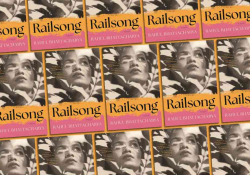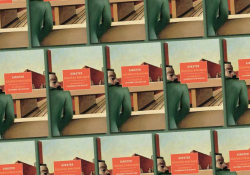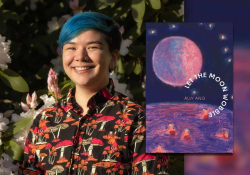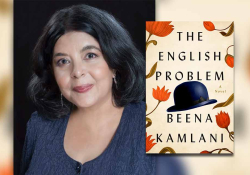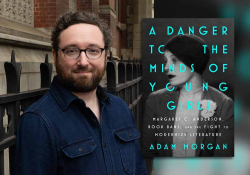Odyssey in an Inkwell: A Review of Captives, by Norman Manea
Under the repressive regime of the Romanian dictator Nicolae Ceaușescu, any work that even hinted at criticism of the state would result in severe punishment for the offending culprit. How Captivi (Eng. Captives, New Directions, 2014), Norman Manea’s first novel published in 1970, got through the censors, their red pens at the ready, the author himself is unable to explain. One explanation may be, however, that his writing is so brilliantly elusive, so ostensibly incoherent that even the censors would have trouble finding a specific phrase or paragraph they could point to as seditious. But the astute reader, aware of the allusions that hover over the missing specifics, soon becomes aware that the truth is gotten at somewhere between the lines: the reality of that society’s dehumanizing existence, its polluted present a result of its corrupt past, depicted by the mangled voice of the madman who tells the tale of three people, all weak, captives all of a state that fears those who would be free.
This, the second edition, as Manea acknowledges in what he calls “Instead of an introduction” to this volume, is its “sometimes overwhelmingly puzzling text.” To ease the reader’s way through the literary maze, he has made some minor changes and excisions. Like all great writers, however, Manea expects his reader to discover meaning through the thicket, willing to do so because the lush beauty of his prose captivates. Like Faulkner, whom he paraphrases, he believes “that a writer should be judged by the risks he takes, even if the risks are conducive to failure.” Fortunately, he has created a challenging text that is anything but a failure. Ironically, the erstwhile “hooligan,” Norman Manea is now regarded as one of Romania’s most important literary figures. His entire oeuvre to date, some twenty-five volumes of fiction and nonfiction, is being published by the very country that forced him into exile decades ago.
Made up of three parts, “She,” “You” and “I,” narrated by the nameless “I” of the work, Captives, beautifully translated by Jean Harris, reveals the impossibility of anyone connecting with anyone else, each the captive of a society that cultivates deception, dishonesty, and despair.
The “She” of the novel is Monica Smântănescu, a teacher who gives piano and French lessons. Described by her cowardly and bullying superior, Covalschi, as a “fat dreamer,” Smântănescu is also bullied by the students in her class, who are depicted as “little lunatic barbarians” who, driven to school in limousines, are actually in this country the privileged children of the Communist Party’s elite. Known only tangentially by the narrator, apparently, who first sees her on a train, he learns she was refused payment for her time by a client who also abuses her, hears her babbling and repeating ultimately only to herself: “Yes, music is my business. . . . Where am I going? . . . I change trains two more times. To see my mother. She’s in a madhouse. The war, the camp. Her husband killed before her eyes, in front of the grave he was forced to dig for himself.” That she was only slightly known by the narrator lends an objective quality to the work by tying her to the general population, ostensibly also abused and cowed by the party’s functionaries and their underlings. Smântănescu also provides as music teacher one of the key structural devices of the work when she repeatedly refers to Handel’s Chaconne in G Major. Like the novel itself, the chaconne consists of variations based on a repeated harmonic pattern. Thus the repetition of phrases and ideas has its analog in the musical form the author uses throughout the work.
The “You” of the work is the daughter of Captain Bogdan Zubcu, a World War II officer fighting on the side of the Nazis. Though acquitted of war crimes, he eventually commits suicide because of the relentless torment of guilt by jumping into “an enormous pot of molten metal.” His daughter, however, despite the overwhelming grief she suffers at the horrible death of her father, does find some solace in the narrator, with whom she has an affair. But he too, like those she cares for, abandons her, her grief compounded, her life shattered. Her distraught mother writes a letter to the narrator describing the grief her daughter endures because of him, the letter—which he carries in his pocket and is meant to make him feel guilty—succeeds in doing so.
It is the “I” of the work, the narrator whose tale this is, who is the most complex, the most profound. He too is damaged because, like those around him, he compromises and betrays not only the girl but his young classmate, Sebastian Caba, for which he feels overwhelming guilt. We learn that two of the narrator’s sisters were incinerated in the “Camp” that the narrator and his parents survived. The narrator’s mother gives birth to a new sister who is given the name Dona; one of the sisters who was killed is Donca: the new sister a seeming replacement for the old.
The “I” of the work is a victim, like Monica Smântănescu and the daughter of Captain Zubcu, but he’s also a perpetrator committing moral and ethical if not criminal offenses against others, namely Sebastian Caba and the daughter of Captain Zubcu. Despite the guilt he feels for having betrayed the captain’s daughter, her mother’s letter denouncing him inflicts deserved guilt on him. But he’s also a bully, like the kids in Monica Smântănescu’s class. He bullies his professor because he’s a Pioneer, one of the children chosen to be a leader because of outstanding abilities. But unlike those who have power or a modicum of it, the narrator does feel guilt, and it is that which drives him mad but paradoxically saves him from becoming part of the corrupt class.
If fire is fought with fire, and poison with poison, then the incoherence of a deranged world is understood, paradoxically, through the voice of one of its equally deranged inhabitants.
If fire is fought with fire, and poison with poison, then the incoherence of a deranged world is understood, paradoxically, through the voice of one of its equally deranged inhabitants. At the end the engineer, the narrator, gives very specific measurements for what he is building. His tenuous hold on reality is gripped through numbers and the structure of music—but even that gives way to the final words: “Look the drumming of the building-material mixers have begun to boom again . . . with the bongos of the tamerial bixers . . . with the bongos and gonbos, and . . . oh, let’s grab another hour of sleep till tomorrow, till morning.” It doesn’t matter how words are said or inverted, their absurdity is evident and must be ignored. But the great paradox is that only through alluding to the lie the Word constructs can the Truth ultimately be revealed.
As others, including Jean Harris in her afterword to the novel, have alluded to, words become impotent and dangerous. One of the characters states: “If only there weren’t words.” Words lie and deceive, obfuscate and lead to madness, which is why numbers and the structure of music are his method of retaining a grip, however fragile, on sanity. The beginning may have been engendered by the Word, but the Word also engendered the lie.
The novel never states it explicitly, but its implications are clear: the narrator and his family are Jewish survivors of the Holocaust; the country is Romania ruled at the time by Stalinist dogma. These major threads are woven into the fabric of Manea’s subsequent material.
In October, Eight O’Clock, his remarkable collection of interrelated stories, many of which are clearly autobiographical, Manea traces the protagonist’s evolution from a five-year-old survivor of the concentration camp through adolescence and adulthood after returning to his native country. Having grasped such basic human characteristics and emotions as language, love, and loyalty during his five years in the camp—where language is harsh and restricted, where love and loyalty have become twisted—the boy comes to learn their value, paradoxically, through having borne witness to their perversion. After his release, when asked what he most feared in the camp, the boy replies: “Beautiful evenings . . . Crows . . . Silence.” For Manea at five years of age, who only knows the world as dangerous and impermanent, where children die and families lose their love for each other, beautiful evenings, like silence, may presage their opposite.
When he is given a book of fairy tales as a reward for being a good student after returning to his native land, the boy’s life is changed. The book’s lesson—a conception hinted at in Captives—is that anything could become anything else, including a little pig who became the emperor’s son at night: “It scared him . . . the emperor’s son could become what he had just been, with no one to recognize or save him. The fairy tales were real, and each one held a threat. . . . The fear had come back.” Thus the book of fairy tales has recorded the transmogrifications in such a way as to fascinate and enthrall the young boy. But having been witness during a night that lasted five years, the boy, like Kafka, aware of the potential horror of such metamorphoses, is once again beset by the fear that was his in the camp.
Recognizing his having been morally tainted by the power bestowed upon him by the state, he also recognizes, oddly enough, that his extraordinary odyssey “demands an inkwell.”
At the conclusion of the linked story, one of his most brilliant and profound, “The Instructor,” the boy is now referred to as the “young man.” But this boy has his antecedents in the narrator of Captives. Like the narrator, the boy is a Pioneer, entrusted with the malicious power of spying on his fellow campers, reading their letters to their parents; he acts as censor, a duty he increasingly comes to hate. Confused and alone, on the verge of manhood, he is buffeted by all facets of an engaged life: politics and religion, loyalty and honor, family and state, cowardice and courage, reality and art, time and its passing, the documentary of the camp with the film of life—all colliding and merging as he realizes he is made to be a traitor to the religion of his parents, an exile in his homeland. Recognizing his having been morally tainted by the power bestowed upon him by the state, he also recognizes, oddly enough, that his extraordinary odyssey “demands an inkwell.” This insistence on the metonymic “inkwell” is his assertion that he will be a writer, that the film in his head must be transcribed to paper, the recognition of which makes him think of himself as a “conceited little prig.” Thus, because of the awareness of his own corruptibility, of which pride may be the single most powerful component, the boy paradoxically maintains a moral posture precisely through his acknowledgment of having lost it. This moral ambivalence is rooted in his memory of anything capable of becoming anything else, which he first observed in the camp and which was reinforced for him through the language of the book of fairy tales given to him when he emerged from the camp. His initiation—his bar mitzvah, if you will—into the world of the religion that caused such torment for him and his family and into the world of politics that immediately revealed its own corruption also awakens in him the world of art, into becoming the creator who must transmute the materials of life into the language of literature so as to determine meaning in a world that otherwise has none.
“The Interrogation,” one of four short novellas in Compulsory Happiness, is set in a prison where the Interrogator queries a female artist who’d been separated from other “radicals” that would undermine the stability of the state. Once having tried his hand at being an artist, the Interrogator speculates that the consuming passion people are driven by in art is related to the very force that made him “the product, some would add the symbol of corruption.” Thus the unholy alliance he recognizes among such disparate elements as art, depravity, and love is also painfully recognized by her as an integral part of her own nature. In On Clowns: The Dictator and the Artist, Manea writes: “At the onset of my exile, I wished to discuss the relationship between the writer, the Power, and the not-so-innocent oppressed masses. And the relationship between the writer and his own vulnerability.”
If many writers or artists were willing or unwilling collaborators, many consciously were not. In “Romania,” a pivotal essay in On Clowns, Manea asserts the writer was capable of resisting, maintaining an honesty, a moral and artistic integrity that challenged the terror itself in order to affirm human dignity and decency. Because the reader could not locate truth in the media or in the history books, he or she searched for it in the literary work of its writers who placed it between the lines, a process that “involved inordinate amounts of energy, inner exile, and sometimes more.” A distant echo of Stephen Dedalus, who realized at the outset of his literary life that “silence, exile and cunning” were the essential tools of the artist, the process to which Norman Manea alludes is also characteristic of his fiction, endowing it with the complex and penetrating truth that even the totalitarian state doesn’t always succeed in concealing with compulsory happiness.
In “Romania,” a pivotal essay in On Clowns, Manea asserts the writer was capable of resisting, maintaining an honesty, a moral and artistic integrity that challenged the terror itself in order to affirm human dignity and decency.
In fact, having endured the slings and arrows his country had flung at him, Manea himself is the triumphant one as his brilliant and incisive memoir, The Hooligan’s Return, proves. It describes in experimental form not only his biographical life—what he and his family suffered under the Nazis and their allies—but also his philosophical and emotional life endured under the communist regime of Nicolae Ceaușescu and after, suffering anti-Semitic slurs as well as accusations of being a traitor. Called a hooligan in Romania, where it has a much more malevolent connotation than it does here, Manea wears the label with pride, a badge of honor worn only by those willing to risk all.
A recipient of the MacArthur Fellowship, a nominee for the Nobel Prize in Literature, winner of numerous literary awards and honors in the US and Europe, a distinguished professor and writer-in-residence at Bard College, Norman Manea has had his work translated into more than twenty languages in all parts of the world. In Captives, he had sown the seeds that sprouted in his subsequent work. Complex, profound, intriguing, and eminently rewarding, his brilliant Romanian canon, in speaking to a specific time and place, continues to speak to us all wherever we are.


